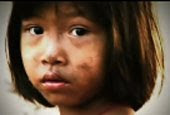Those who think that commercial sex in this country is invariably voluntary — and especially men who pay for sex — should listen to her story. The men buying her services all mistakenly assumed that she was working of her own volition, she says.
Yumi Li (a nickname) grew up in a Korean area of northeastern China. After university, she became an accountant, but, restless and ambitious, she yearned to go abroad.
So she accepted an offer from a female jobs agent to be smuggled to New York and take up a job using her accounting skills and paying $5,000 a month. Yumi’s relatives had to sign documents pledging their homes as collateral if she did not pay back the $50,000 smugglers’ fee from her earnings.
Yumi set off for America with a fake South Korean passport. On arrival in New York, however, Yumi was ordered to work in a brothel.
“When they first mentioned prostitution, I thought I would go crazy,” Yumi told me. “I was thinking, ‘how can this happen to someone like me who is college-educated?’ ” Her voice trailed off, and she added: “I wanted to die.”
She says that the four men who ran the smuggling operation — all Chinese or South Koreans — took her into their office on 36th Street in Midtown Manhattan. They beat her with their fists (but did not hit her in the face, for that might damage her commercial value), gang-raped her and videotaped her naked in humiliating poses. For extra intimidation, they held a gun to her head.
If she continued to resist working as a prostitute, she says they told her, the video would be sent to her relatives and acquaintances back home. Relatives would be told that Yumi was a prostitute, and several of them would lose their homes as well.
Yumi caved. For the next three years, she says, she was one of about 20 Asian prostitutes working out of the office on 36th Street. Some of them worked voluntarily, she says, but others were forced and received no share in the money.
Yumi played her role robotically. On one occasion, Yumi was arrested for prostitution, and she says the police asked her if she had been trafficked.
“I said no,” she recalled. “I was really afraid that if I hinted that I was a victim, the gang would send the video to my family." . . .
No one has a clear idea of the scale of the problem, and estimates vary hugely. Some think the problem is getting worse; others believe that Internet services reduce the role of pimps and lead to commercial sex that is more consensual. What is clear is that forced prostitution should be a national scandal. Just this month, authorities indicted 29 people, mostly people of Somali origin from the Minneapolis area, on charges of running a human trafficking ring that allegedly sold many girls into prostitution — one at the age of 12.
There are no silver bullets, but the critical step is for the police and prosecutors to focus more on customers (to reduce demand) and, above all, on pimps. Prostitutes tend to be arrested because they are easy to catch, while pimping is a far harder crime to prosecute. That’s one reason thugs become pimps: It’s hugely profitable and carries less risk than selling drugs or stealing cars. But that can change as state and federal authorities target traffickers rather than their victims. . .
Read the full article here.
----------------------------------------------------------------------
Nicholas Kristof rightly points out the common misconception that human trafficking occurs only outside the U.S. borders. Awareness of the global nature of human trafficking merits great emphasis in the fight for abolition. The stories told by countless survivors demonstrates the strength of the human spirit and creates new impetus for addressing the demand side of this profitable trade.



 We’ve accomplished another milestone in the fight against modern day slavery. Thanks to our fellow abolitionists we have successfully raised $7,500 for
We’ve accomplished another milestone in the fight against modern day slavery. Thanks to our fellow abolitionists we have successfully raised $7,500 for











